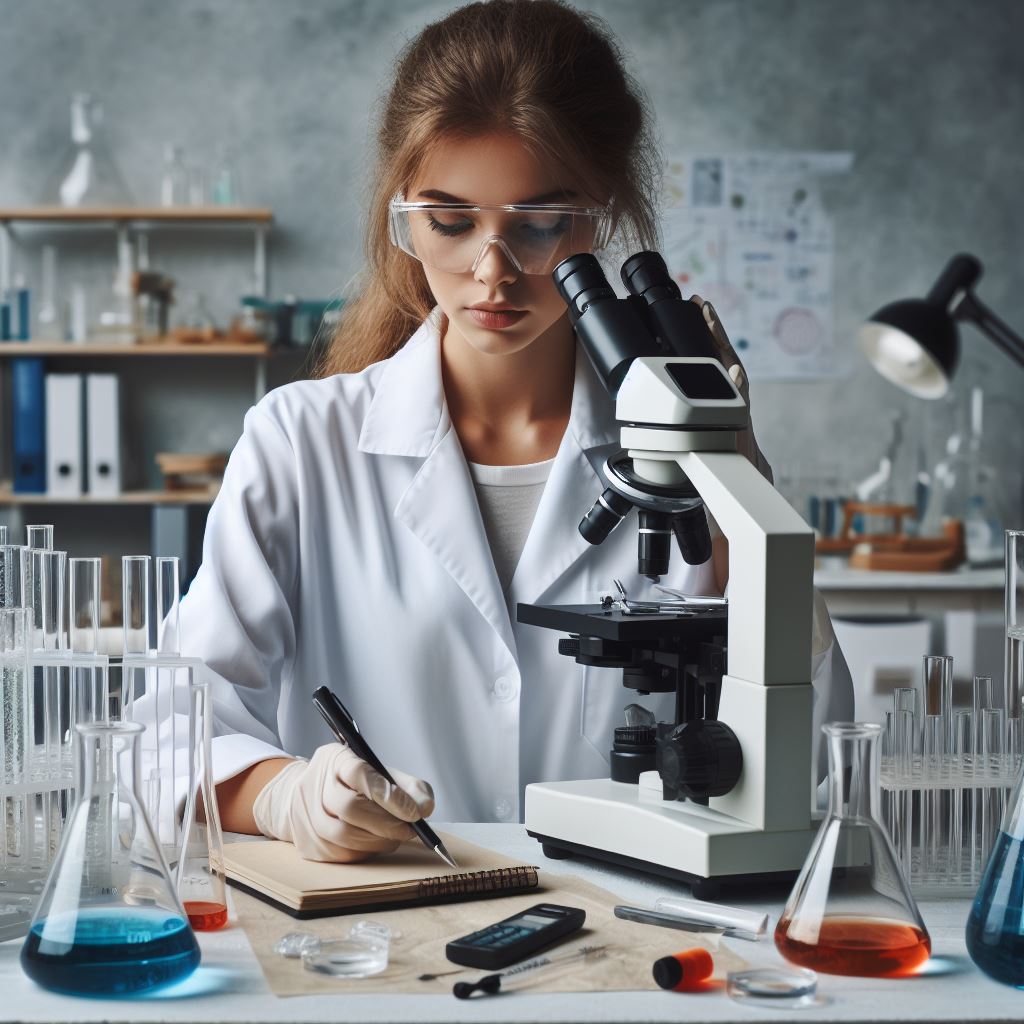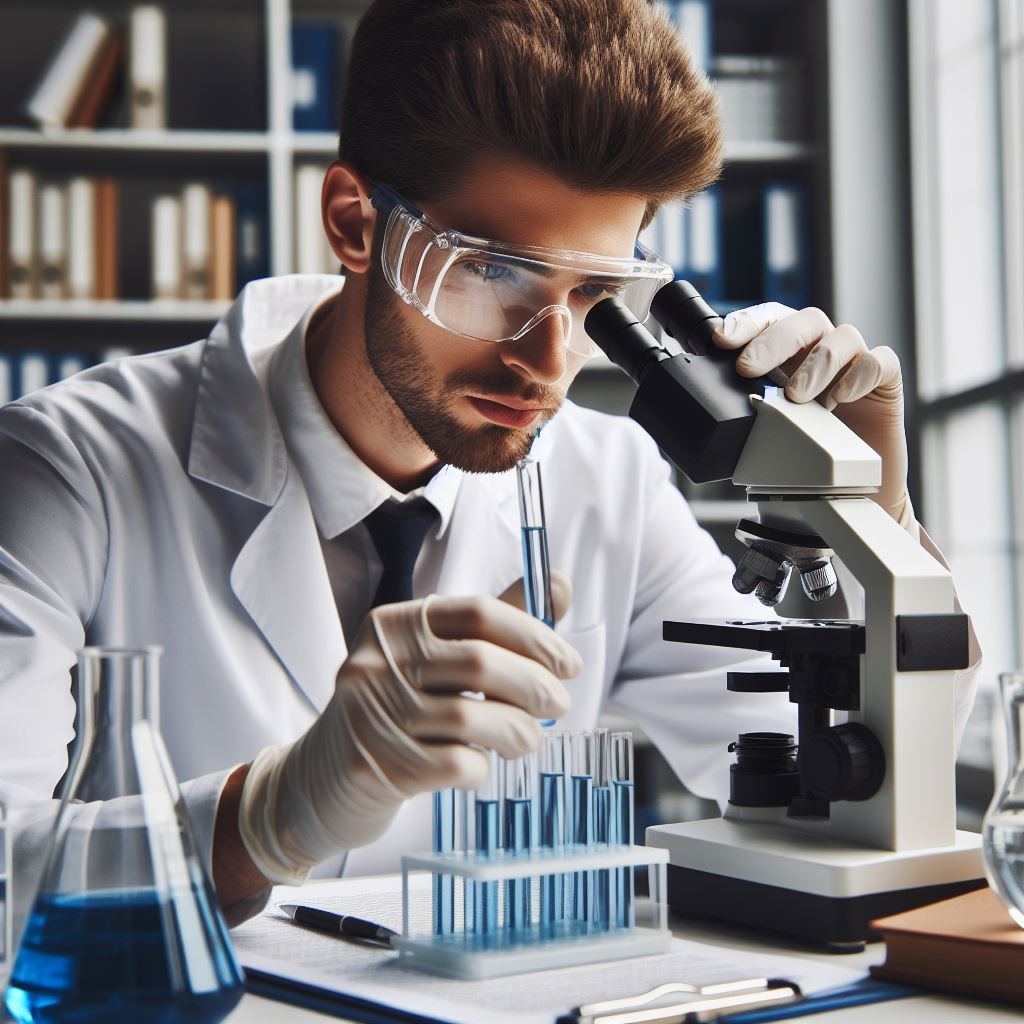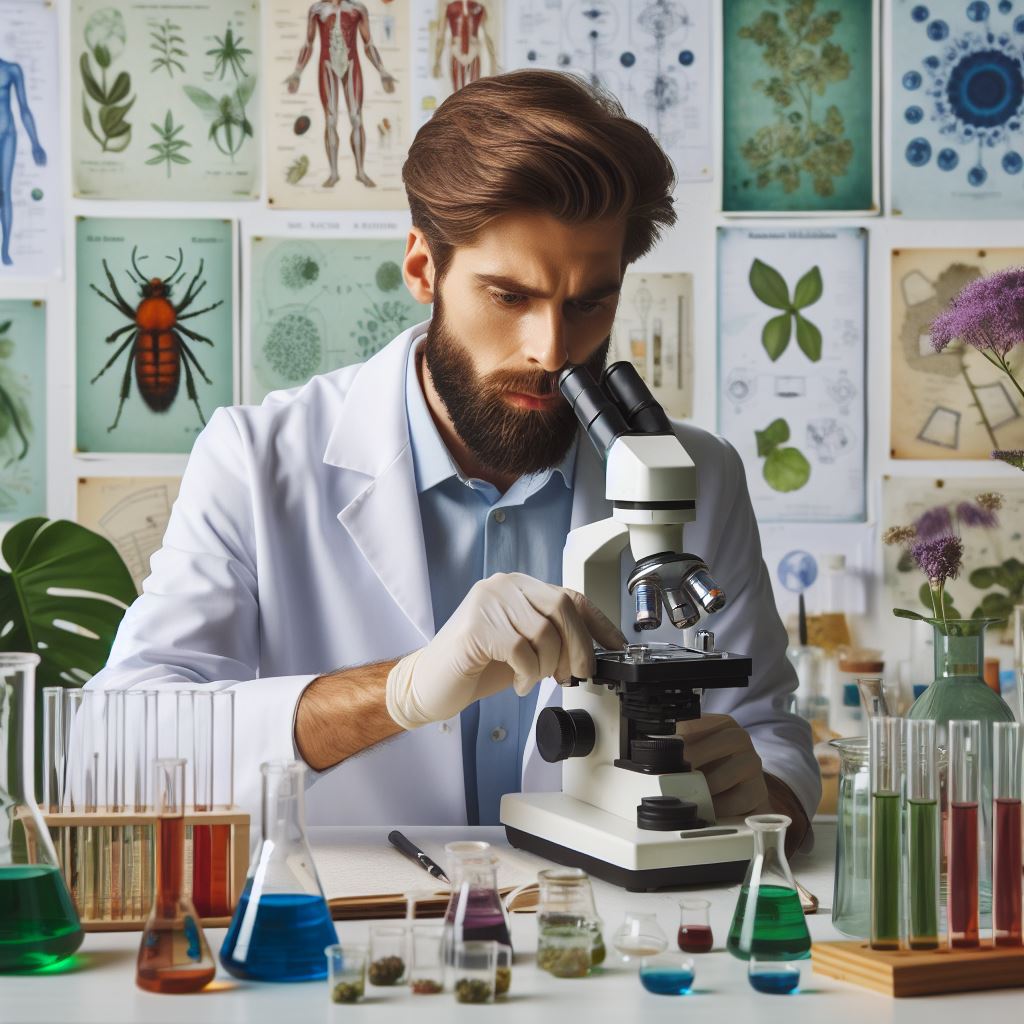Introduction
UK biologists play a vital role in global conservation efforts.
They are professionals dedicated to researching, studying, and preserving the environment and its diverse species.
Their work is of utmost importance, not only for the UK but also for the entire world.
Biologists in the UK are trained experts who actively engage in understanding the complexities of various ecosystems and their delicate balance.
They investigate the interactions between organisms and their environments, identifying threats to biodiversity, and developing strategies to mitigate them.
By conducting research and collecting data, they contribute to the development of scientific knowledge and understanding about the natural world.
Global conservation is imperative to ensure the survival of species and maintain the health of ecosystems.
It addresses issues such as habitat destruction, climate change, pollution, and the illegal wildlife trade.
The effects of these challenges are not limited to one country or region but have far-reaching consequences for the entire planet.
The UK, with its rich biodiversity and heritage, has a responsibility to lead in global conservation efforts.
The collaborative work of UK biologists with international organizations, governments, and local communities is instrumental in protecting endangered species, restoring degraded habitats, and implementing sustainable practices.
With their expertise and research, UK biologists contribute to the identification and implementation of conservation measures worldwide.
They actively participate in international conferences, collaborate on global initiatives, and share knowledge and best practices with their counterparts in other countries.
In fact, UK biologists have a significant role in global conservation.
Their dedication to preserving the environment and their expertise in understanding ecosystems are essential for addressing the urgent challenges facing our planet today.
Through their work, they contribute to the protection of biodiversity and the sustainable management of natural resources on a global scale.
Overview of UK Biologists
A UK biologist is a professional who studies living organisms and their interactions within the United Kingdom.
Education and training requirements
To become a UK biologist, one must complete a bachelor’s degree in biology or a related field and obtain relevant work experience.
Areas of specialization within the field
UK biologists can specialize in various areas such as ecology, genetics, marine biology, conservation, and wildlife management.
Research and practical skills possessed by UK biologists
- Research skills: UK biologists possess the ability to design and conduct scientific experiments to gather data.
- Data analysis: They have proficiency in analyzing and interpreting scientific data using statistical methods.
- Fieldwork expertise: UK biologists are skilled in collecting samples, conducting surveys, and studying organisms in their natural habitats.
- Conservation knowledge: They have deep knowledge of conservation strategies and techniques to protect and preserve biodiversity.
- Communication skills: UK biologists excel in presenting research findings, writing scientific papers, and engaging with the public to promote conservation efforts.
- Collaboration: They work collaboratively with other scientists, policymakers, and local communities to develop effective conservation plans.
- Policy development: UK biologists contribute to the formulation of environmental policies and regulations based on their scientific expertise.
- Environmental impact assessment: They assess the potential ecological impacts of human activities and provide recommendations for sustainable practices.
- Technology utilization: UK biologists utilize advanced technologies such as DNA sequencing and remote sensing to enhance their research and conservation efforts.
- Continual learning: They stay updated with the latest scientific advancements and attend conferences and workshops to expand their knowledge and skills.
In short, UK biologists play a crucial role in global conservation by studying, protecting, and managing the diverse ecosystems within the United Kingdom.
With their expertise and skills, they contribute to the understanding and preservation of biodiversity, ensuring a sustainable future for both local and global communities.
Read: Data Analyst Salaries in the UK: 2024 Overview
Role of UK Biologists in Global Conservation Efforts
Conservation projects and organizations in the UK
Biologists in the UK play a crucial role in various conservation projects and organizations.
They actively engage in protecting and preserving local ecosystems, working with national parks, wildlife trusts, and conservation charities.
Their efforts focus on habitat restoration, species conservation, and raising awareness among the public.
Through these projects, UK biologists contribute significantly to global conservation goals,
as many species and habitats are interconnected worldwide.
Collaboration with international conservation initiatives
UK biologists actively collaborate with international conservation initiatives, recognizing the global nature of conservation challenges.
They work together with scientists, NGOs, and governments from different countries, sharing knowledge, resources, and expertise to address shared conservation concerns.
This collaboration allows for the development of effective strategies and actions on a global scale,
ensuring the protection of biodiversity beyond national borders.
Research and monitoring of global biodiversity
UK biologists play a vital role in researching and monitoring global biodiversity.
They conduct scientific studies to understand ecosystems, species populations, and environmental changes.
Through field surveys, genetic analyses, and remote sensing technologies, biologists gather data to assess the health of ecosystems and the status of endangered species.
Their research provides valuable insights for conservation planning and management worldwide.
Advocacy and policy influence in international conservation
UK biologists are actively involved in advocacy and policy influence in international conservation arenas.
They contribute their scientific expertise to inform policy decisions, both nationally and globally.
Through participation in conferences, meetings, and collaborations with policymakers, biologists ensure the inclusion of scientific evidence and conservation priorities in policy discussions.
Their influence helps shape international agreements and frameworks that promote conservation actions.
Personalized UK Career Consulting
Receive tailored career guidance designed just for you. Get actionable steps and expert support to boost your career in 1-3 days. Take control of your career now.
Get StartedIn summary, UK biologists occupy a significant role in global conservation efforts.
Through their involvement in conservation projects and organizations, collaboration with international initiatives, research and monitoring of global biodiversity, and advocacy and policy influence, they contribute towards the protection and preservation of ecosystems and species worldwide.
Their active engagement is essential for the achievement of global conservation goals and the sustainable future of our planet.
Read: Top UK Industries Hiring Data Analysts in 2024

Examples of UK Biologists Making a Difference in Global Conservation
Case studies of successful conservation projects led by UK biologists
- The Durrell Wildlife Conservation Trust, founded by Gerald Durrell, has transformed endangered species preservation globally.
- UK biologist Lucy King’s innovative beehive fences have significantly reduced human-elephant conflicts in Kenya.
- Dr. Jane Goodall’s pioneering research on chimpanzees in Africa has reshaped conservation approaches worldwide.
- The RSPB’s efforts led by UK biologists have successfully restored populations of the critically endangered Albatross in the Southern Ocean.
Contributions of UK biologists to international wildlife conservation
- UK biologists played a crucial role in establishing the Convention on International Trade in Endangered Species (CITES).
- Biologists from the UK have been instrumental in designing and implementing effective monitoring programs for migratory bird species.
- UK biologists have been actively involved in enhancing protected area management strategies across the globe.
- Their expertise in conservation genetics has enabled UK biologists to contribute significantly to global efforts in species conservation.
Notable UK biologists and their impact on global conservation efforts
- Sir David Attenborough, a renowned UK biologist and naturalist, has inspired millions to care about the planet’s biodiversity.
- Professor Richard Fortey’s research on coral reefs has aided international efforts in protecting these fragile ecosystems.
- Dr. Mary Gillham’s exploration and documentation of biodiversity in remote regions have expanded our understanding of global conservation.
- Professor Rosie Woodroffe’s studies on carnivore conservation have influenced conservation policies worldwide.
These examples illustrate the remarkable role played by UK biologists in global conservation efforts.
Through their leadership, innovation, and scientific expertise, they have contributed to the success of various conservation projects and made a significant impact on preserving biodiversity worldwide.
Whether it is through their involvement in specific projects, their contributions to international wildlife conservation frameworks, or their individual research and advocacy efforts, UK biologists continue to make a profound difference in the field of global conservation.
Their work serves as an inspiration to all, highlighting the potential for scientific knowledge and dedication to create positive change.
It emphasizes the importance of collaborative efforts and the need for continued support for conservation initiatives led by UK biologists.
With their commitment and expertise, these biologists offer hope for a more sustainable and biodiverse future.
Read: Continuing Education for UK Lab Techs
Challenges Faced by UK Biologists in Global Conservation
Funding limitations and resource constraints
- Limited funding poses a significant challenge for UK biologists involved in global conservation efforts.
- Biologists often struggle to secure funding for their research projects, hindering their ability to contribute effectively.
- Resource constraints further exacerbate the issue by limiting the equipment, technology, and manpower available for conservation work.
- The lack of financial support and necessary resources hampers the progress and scale of conservation initiatives.
- UK biologists find themselves constantly competing for limited funds, making it difficult to sustain long-term conservation efforts.
Addressing global conservation issues from a local perspective
- UK biologists face the challenge of bridging global conservation goals with local contexts and challenges.
- Conservation efforts must take into account the unique environmental, social, and cultural factors of different regions.
- Biologists need to collaborate and communicate effectively with local communities to gain their support and cooperation.
- Ensuring that conservation strategies align with local interests helps in achieving sustainable and long-term impact.
- The challenge lies in finding a balance between global conservation objectives and considering the specific needs of local ecosystems.
Balancing research, conservation, and public engagement
- UK biologists strive to strike a balance between conducting research, implementing conservation measures, and engaging the public.
- They need to allocate time and resources for collecting and analyzing data while also actively participating in conservation projects.
- Engaging the public through education and awareness campaigns is crucial for fostering a sense of environmental responsibility.
- Balancing these different aspects can be demanding, as each requires significant dedication and expertise.
- UK biologists must effectively manage their time and prioritize activities to achieve successful outcomes in all areas.
In review, UK biologists face various challenges in contributing to global conservation efforts.
The limitations of funding and resources, the need to address global issues from a local perspective, and balancing research, conservation, and public engagement all pose significant hurdles.
However, with dedication, collaboration, and innovative strategies, UK biologists continue to play a crucial role in global conservation, striving to protect biodiversity and preserve ecosystems for future generations.
Read: Stress Management for UK Lab Techs
Find Out More: Career Progression for UK Research Scientists
Conclusion
Recap of the role of UK biologists in global conservation
UK biologists play a crucial role in global conservation, conducting research, implementing conservation measures, and raising awareness.
Importance of continued support and recognition for their contributions
Sustained support and recognition for UK biologists is essential to ensure their efforts are maximized and their achievements acknowledged.
Encouragement for aspiring biologists to pursue a career in global conservation
Young biologists should be encouraged to pursue a career in global conservation, as their dedication and expertise are vital in preserving our planet’s biodiversity.
[E-Book for Sale]
500 Cutting-Edge Tech Startup Ideas for 2024 & 2025: Innovate, Create, Dominate
$19.99 • 500 Tech Startup Ideas • 62 pages
You will get inspired with 500 innovative tech startup ideas for 2024 and 2025, complete with concise descriptions to help you kickstart your entrepreneurial journey in AI, Blockchain, IoT, Fintech, and AR/VR.




